Falling Walls Conference 2014 this weekend in Berlin
This weekend the Falling Walls Conference 2014 will take place in Berlin. On Saturday it starts with a Lab where 100 ideas from 38 nations will be presented in just 3 minutes each. As community partner CODE_n will present the CODE_n alumni Solarkiosk at Falling Walls Venture. The Solarkiosk is a decentralized and autonomous energy solution, which provides clean energy for 24/7 operation of local business. The Solarkiosk technology is designed to evolve along with its community and meet their demand for better services and energy provision, while pioneering a new path-to-market for a vast number of potential products and services which were previously unavailable. The Solarkiosk can become a clinic, school, bank, police station, cinema, Internet service provider, and telecom tower energy provider, among many others.
Falling Walls Venture: a gathering of science based start-ups, investors and opinion leaders (November 8)
Falling Walls Venture is an international forum for outstanding science based start-up companies, venture capitalists and strategic investors as well as their wider academic environment. About 20 leading academic institutions and venture capitalists present their most outstanding science based enterprises to an audience and a distinguished jury. The first edition took place on 8 November 2013, the eve of the Falling Walls Conference 2013.
Format: 20 leading international academic institutions and international venture capitalists each nominate their most outstanding science based start-up. Following a one minute introduction by the recommending institution each start-up is presenting their case in five minutes. Then two minutes of discussion are to follow. An international jury awards the most convincing concept. The winners (Falling Walls Science Start-Up of the Year) present themselves in front of an audience of 800 international decision makers at the Falling Walls Conference on the next day, 9 November.
Falling Walls Lab (November 8 | 10.00 am to 7.00 pm)
The 100 young women and men come from 38 nations but have one thing in common: they are all competing to solve societal challenges through innovation and to answer the big questions about the future with the most creative ideas. A total of 100 young talents have passed a rigorous selection process and are bound for the international Falling Walls Lab Finale in Berlin. There the young scientists, professionals and emerging entrepreneurs from different disciplines will be able to present their research results, business ideas and initiatives in 3 minutes each. These include, among other ideas, a windmill that generates green energy from the air movement of passing by traffic on the side of roads or an emergency protection system that offers survivors and rescuers location information and immediate assistance – through the use of drones and other high-tech equipment.
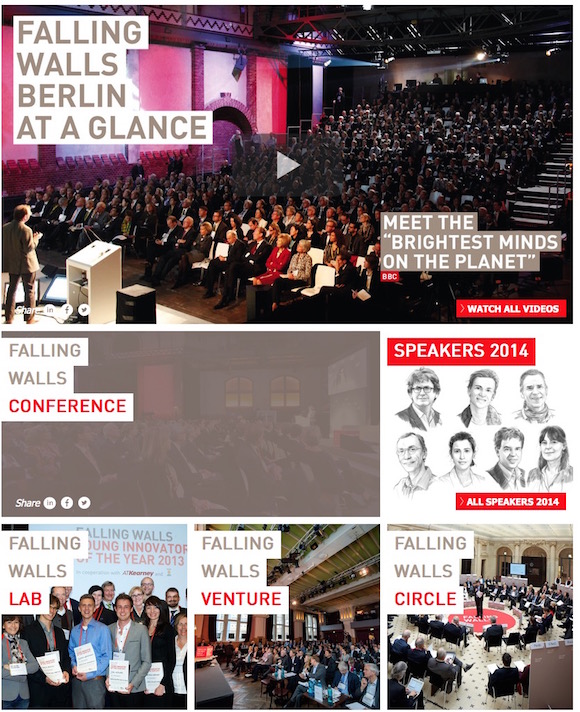
See full programm of day 1 here.
The three most innovative ideas will be awarded prizes by a high-calibre international jury from science and industry led by Professor Carl-Henrik Heldin, Chairman of the Nobel Foundation, and Dr Martin Sonnenschein, Managing Director Central Europe at A.T Kearney (list of all jury members.
As the ‘Falling Walls Young Innovators of the Year 2014’, the winners will have the opportunity to present their ideas at the international Falling Walls Conference on Future Breakthroughs in Science and Society in front of 600 guests on 9 November 2014.
Falling Walls Conference (November 9 | 10.00 am to 7.00 pm)
The Falling Walls science conference will be held on 9 November, the day of the 25th anniversary of the fall of the Berlin Wall for the sixth time this year. For the first time, a Nobel laureate who received his award only this year will be giving a presentation.
A few days ago the Göttingen researcher Stefan Hell was awarded the Nobel Prize for Chemistry for his role in developing STED microscopy. Hell will be talking about this scientific breakthrough and its many new areas of application at the Falling Walls Conference. Nanoscopy enables living cells to be examined in very high resolution, right down to the level of individual molecules. For example, the method is used for investigating proteins that play an important role in diseases such as Parkinson’s and Alzheimer’s.
Other speakers include the Israeli psychiatrist Zahava Solomon of Tel Aviv University. She is researching the psychological impact of war imprisonment, participation in war, and the Holocaust. Together with an interdisciplinary team, she is looking for innovative therapeutic approaches to the treatment of mass trauma, which not only permanently damages the lives of those affected, but also that of their families over several generations.
On the occasion of the 25th anniversary of the fall of the Berlin Wall, the Falling Walls Foundation has invited the presidents of the science academies of the four former occupying powers to Berlin. Sir Paul Nurse, Nobel Laureate and President of the British Royal Society; Philippe Taquet, President of the Académie des Sciences in France; Diane Griffin, Vice President of the United States National Academy of Sciences; and the Vice President of the Russian Academy of Sciences, Lev Zelenyi, will be present on 9 November to discuss the scientific breakthroughs needed over the next 25 years in order to meet current global challenges.
List of speakers and the full programme.

The live stream on the day of the event.


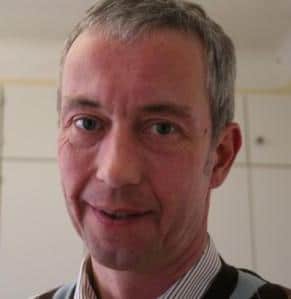
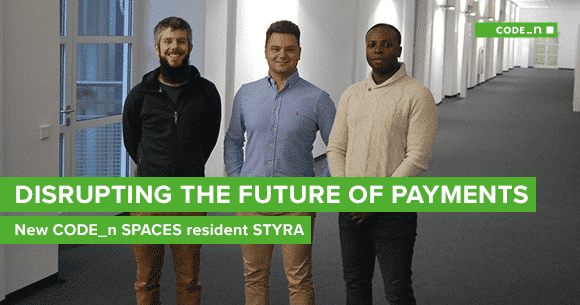
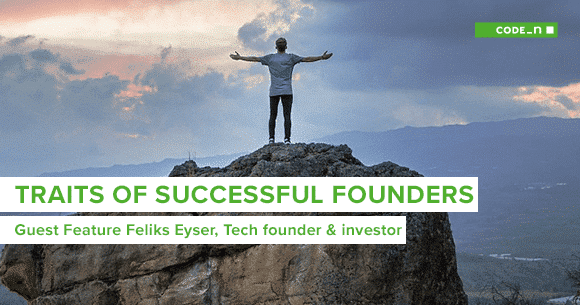
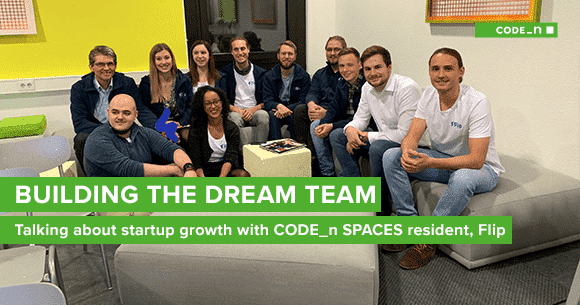
Write a comment